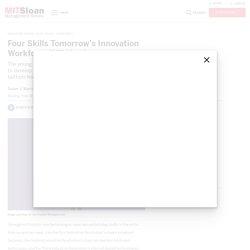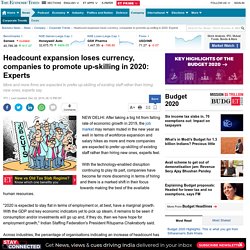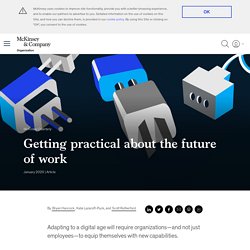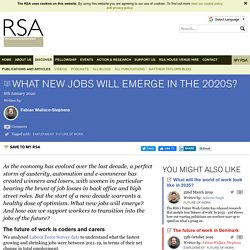

MITSMR LDS Future of Work. Four Skills Tomorrow’s Innovation Workforce Will Need. The young digerati will lead innovation, but they’ll need business awareness, an entrepreneurial attitude, bottom-line focus, and ethical intelligence.

MIT SMR Frontiers This article is part of an MIT SMR initiative exploring how technology is reshaping the practice of management. Throughout history, new technologies have demanded step shifts in the skills that companies need. Like the First Industrial Revolution’s steam-powered factories, the Second Industrial Revolution’s mass-production tools and techniques, and the Third Industrial Revolution’s internet-based technologies, the Fourth Industrial Revolution — currently being driven by the convergence of new digital, biological, and physical technologies — is changing the nature of work as we know it.
Now the challenge is to hire and develop the next generation of workers who will use artificial intelligence, robotics, quantum computing, genetic engineering, 3D printing, virtual reality, and the like in their jobs. Headcount expansion loses currency, companies to promote up-skilling in 2020: Experts. NEW DELHI: After taking a big hit from falling rate of economic growth in 2019, the job market may remain muted in the new year as well in terms of workforce expansion and salary hikes as more and more companies are expected to prefer up-skilling of existing staff rather than hiring new ones, experts feel.

With the technology-enabled disruption continuing to play its part, companies have become far more discerning in terms of hiring and there is a marked shift in their focus towards making the best of the available human resources. "2020 is expected to stay flat in terms of employment or, at best, have a marginal growth. With the GDP and key economic indicators yet to pick up steam, it remains to be seen if consumption and/or investments will go up and, if they do, then we have hope for employment growth," Indian Staffing Federation's President Rituparna Chakraborty said. Across industries, the percentage of organisations indicating an increase of headcount has gone down. Getting practical about the future of work.
What story will people tell about your organization over the next ten years?

Will they celebrate an enthusiastic innovator that thrived by adapting workforce skills and ways of working to the demands of the new economy? Or will they blame poor financial or operational results, unhappy employees, and community disruption on a short-sighted or delayed talent strategy? Our modeling shows that by 2030, up to 30 to 40 percent of all workers in developed countries may need to move into new occupations or at least upgrade their skill sets significantly.
Research further suggests that skilled workers in short supply will become even scarcer. Some major organizations are already out front on this issue. Any company that doesn’t join the early adopters and address its underlying talent needs may fall short of its digital aspirations. Why employers should lead the way. FutureForward 2025. What new jobs will emerge in the 2020s?
As the economy has evolved over the last decade, a perfect storm of austerity, automation and e-commerce has created winners and losers, with women in particular bearing the brunt of job losses in back office and high street roles.

But the start of a new decade warrants a healthy dose of optimism. What new jobs will emerge? And how can we support workers to transition into the jobs of the future? The future of work is coders and carers We analysed Labour Force Survey data to understand what the fastest growing and shrinking jobs were between 2011-19, in terms of their net change in total employment. Bundles of energy in HR at BP. Peter Crush, October 14, 2019 Really interesting and I love the idea about HR creating / catalysing an ecosystem.

But "HR professionals need to be businesspeople first who just so happen to look after the people agenda. " hugely ... Jon Ingham, The Social OrganizationOctober 14, 2019 16:17 The oil and gas giant’s group HRD has a very clear idea of how HR can help the business transform and be fit for the future. Technology, young people and reverse mentoring will all play a part It was Oscar Wilde who wrote ‘it is what you read when you don’t have to that determines what you will be when you can’t help it’.
“Did you know a cursive ‘swish’ font is the best one for a drinks menu?” He adds: “Interesting isn’t it, how we as HR professionals decide to present staff communications?” Schuster is one of life’s thinkers, finding intellectual stimulation from a wide variety of unexpected sources. Careers of the Future: 42 Professions of Tomorrow - The Startup - Medium. Ensuring Good Future Jobs FINAL. Future of jobs and skills in the UK construction sector to 2030. LASA Case studies videos. Forecast StratWorkforcePlanningCaseStudy.